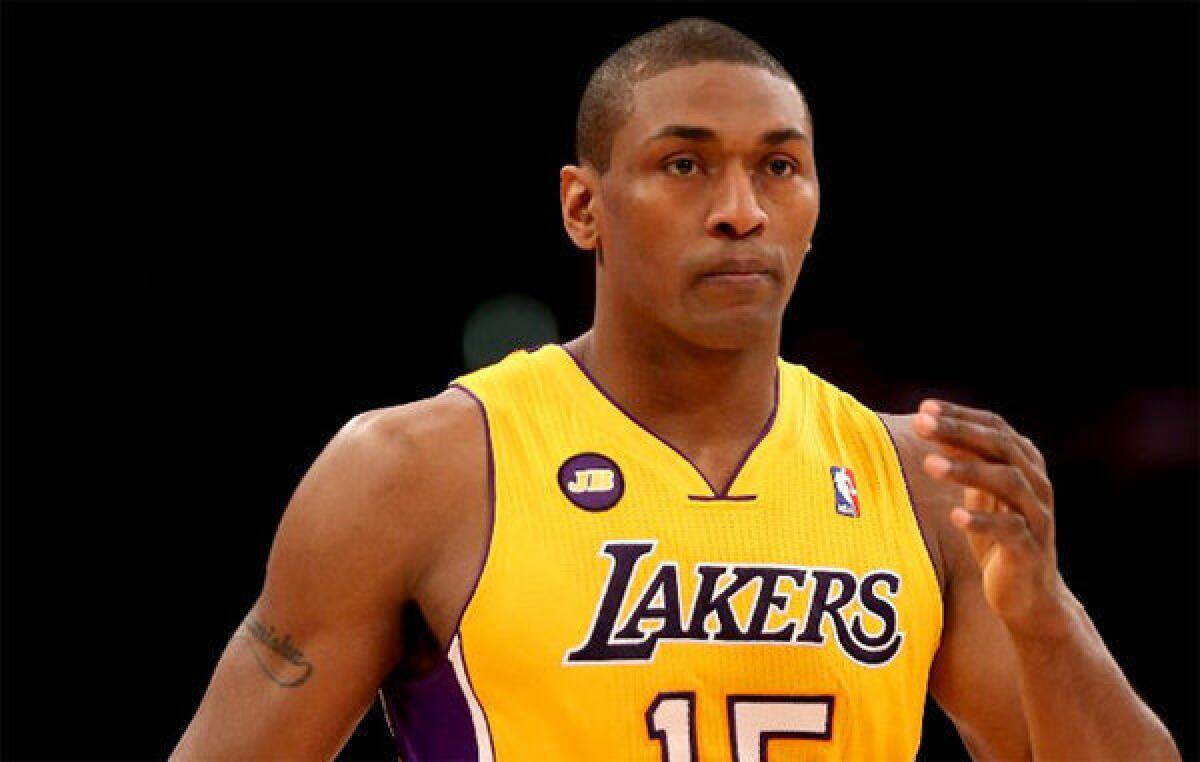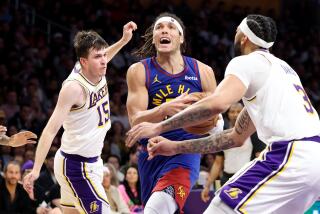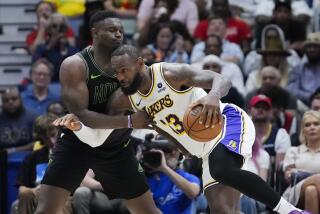Can Lakers contain shooters Chandler Parsons, Carlos Delfino?

The Lakers (44-37) have been bombarded by the Rockets’ (45-36) small forwards this season. Can they slow down the likes of Chandler Parsons and Carlos Delfino enough to make sure they pull out a win? The Lakers’ postseason may entirely depend on how well they defend the Houston shooters.
Small forward — probable starters: Metta World Peace vs. Chandler Parsons
The Lakers have gotten great numbers from Metta against the Rockets this season. In three appearances, he’s averaging 16 points a game on 62.1% shooting from the field and 60% from three.
One of the biggest questions the Lakers face without Kobe Bryant (Achilles’ tear) is scoring. The team expects to feed its big men the ball inside, force double teams and rely on shooters to successfully spread the floor.
If World Peace can continue shooting at the same level he did this season against the Rockets, the greater concern becomes shutting down Houston’s offense.
The Rockets don’t have a traditional scoring big man. They rely on dribble penetration along with a steady diet of pick-and-rolls.
Parsons has a quick trigger on his jump shot. In three games against the Lakers, he’s averaged 18 points on 53.8% shooting from the field and 50% from behind the arc.
Defensively, World Peace may be better suited against the bigger, stronger small forwards in the league. The greater challenge is chasing the quicker players around screens as they play off the ball.
Keeping a man on Parsons is not an easy task given how much attention the Lakers need to give while guarding players like James Harden and Jeremy Lin. The Rockets have a much more difficult time scoring when their outside shooters aren’t converting.
Bench: Earl Clark, Antawn Jamison, Devin Ebanks vs. Carlos Delfino, Francisco Garcia, James Anderson
Bryant played multiple positions for the Lakers including small forward. Earl Clark will probably get the bulk of the minutes behind World Peace.
Clark earned his first sizable run of minutes this season in a Jan. 8 loss to the Rockets. He played over 20 minutes, giving Coach Mike D’Antoni a strong impression after playing only 17 minutes over the previous 15 games. The 6-10 forward has been a regular part of the rotation ever since.
Jamison primarily plays power forward but also logs time at the three. Against the Rockets, Jamison has averaged 10 points a game on 44.4% shooting including 46.2% from three.
Delfino plays both forward positions and even some guard. Garcia is a swing player at either the two or the three.
In two games against the Lakers, Delfino has averaged 17 points a game while shooting 44.8% from the field and 47.1% from three. He’s been a difficult cover for the Lakers and can be even more of a threat when paired on the court with Parsons.
The Lakers have the size advantage at power forward if the Rockets are playing Delfino at power forward, but Pau Gasol isn’t mobile enough to continually chase Delfino out to the three-point line.
Garcia came over mid-season in a trade with the Sacramento Kings. Through 17 appearances with the Rockets, he’s averaging 6.5 points a game while shooting 39.7% from three-point range. He’s another outside threat for the Lakers to deal with.
Ebanks and Anderson aren’t part of their team’s regular rotations.
In addition to strong games offensively from their small forwards, the Lakers will need World Peace, Clark and Jamison to give an inspired effort defensively. The game will have a very different flavor if the Rockets are hitting from the outside.
ALSO:
Preview: Lakers vs. Houston Rockets
Steve Nash close -- but not available for finale against Rockets
Steve Blake needs to keep Jeremy Lin struggling against Lakers
Email Eric Pincus at [email protected] and follow him on Twitter @EricPincus.
More to Read
All things Lakers, all the time.
Get all the Lakers news you need in Dan Woike's weekly newsletter.
You may occasionally receive promotional content from the Los Angeles Times.








